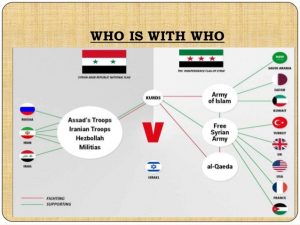Current issues that prove the continued importance of the lessons learned during the Cold War
Cyber Warfare and Misinformation

Another lesson from the Cold War that is still applicable to the present and the future is the ability to deal with misinformation. Our enemies use the internet to inject misinformation into the minds of the American people. This is intended to destabilize the country by creating distrust between the government and its people, which is a form of cyber espionage. The Cold War was defined by espionage efforts between the United States and the Soviet Union, which means that we developed many strategies for dealing with Soviet interference. If the last decade is any indication, one of the biggest threats to our national security in the 21st century will be the interference and misinformation from Russia.
This article was published on December 17, 2020, showing the immediate and constant nature of cyber warfare. The authors outline the continued cyberattacks of the Russian government against the United States, describing the situation as a “grave risk.” This article also demonstrates that deterrence is still our first response to espionage. President-Elect Biden is quoted in the article saying that there will be “substantial costs,” for the perpetrators of the cyber attacks. This shows that the lessons from the Cold War can still be used to maintain global security in the modern age.
Mutually Assured Destruction

https://www.nytimes.com/2020/10/20/us/politics/russia-nuclear-trump.html
One of the biggest threats is the increased prevalence of nuclear weapons around the globe, with countries such as Iran and North Korea attempting to gain nuclear capabilities. One of the biggest lessons from the Cold War was the ability to be in conflict with an enemy without escalating to nuclear war. This is an essential skill for a nation to have because of the theory of Mutually Assured Destruction, for any conflict between two nuclear powers has the potential to devastate civilizations. As more and more countries around the world develop nuclear capabilities, it will be essential for the United States to engage in conflicts without nuclear weapons. This is just one of the lessons learned during the Cold War that is still relevant today.
This article was published in October of 2020, showing that the issue of nuclear weapons is still one of the biggest issues in international security. The thesis of the article was surrounding an extension of a nuclear treaty between the United States and Russia. The leaders of both countries are quoted in the article in order to get their desired outcome. This is a type of compellence, which is a lesson that was learned during the Cold War. The leaders were using the media as a method of signaling their intentions and desire to maintain the treaty. Compellence is still used to this day to maintain nuclear security because it is still very effective.
Proxy Wars

https://www.nytimes.com/2020/10/26/world/middleeast/russia-airstrikes-syria-turkey.html
Many of the powers in the world are interconnected with complex alliances, which makes military conflicts complicated. This has not changed much in the past century, as it was a staple of the Cold War. In that conflict, the alliances were mostly based on political beliefs, capitalism, and communism. However, the lessons learned from those conflicts are still essential to this day. During the Cold War, the United States learned how to fight proxy wars without engaging the Soviet Union directly. This includes the Korean and Vietnam Wars in which both the US and USSR were involved without direct conflict. This type of conflict still occurs to this day, with the Syrian Civil War being a prime example. The United States and Russia both have an interest in this conflict, but they have managed to defend this interest without fighting declaring war against each other. During the Cold War, the United States and Russia learned how to fight in a third country without causing World War III. This skill is still very relevant to today as it does not appear as if these conflicts will stop anytime soon.
This article details an attack by Russian Forces, in October 2020, on Turkish Rebels in Syria. The Syrian Civil War has many elements of the Cold War-era proxy war because the United States and Russia are both indirectly involved. Both nations have learned, through their experiences in Vietnam and Korea, that it is possible to fight proxy wars without any direct conflict. The ability to fight limited wars allows major military powers to intervene in conflicts around the world without the risk of starting a world war. This lesson learned during the Cold War is essential for maintaining international security.
Picture Sources
Cyber: https://www.dogtownmedia.com/are-we-in-the-era-of-ai-powered-cyber-warfare/
Mutually Assured Destruction: http://schoolshistory.org.uk/topics/world-history/cold-war-1945-1972/mad-mutually-assured-destruction/
Proxy Wars: https://www.businessinsider.com/who-is-involved-in-the-war-in-syria-2013-10
